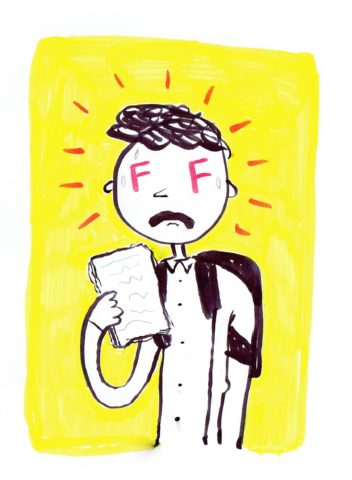For some first-year students, getting a crappy grade can be a stressful and anxious experience. However, getting a bad grade is a lot more common than you would think, and it may not be entirely your fault.
In fact, The Toronto Star reported in 2009 that 55 per cent of professors and librarians at universities felt first-year students were less prepared for the start of their academics than new students even three years earlier, so it’s declining quickly.
Professors and librarians that responded to this survey reported their reasoning behind the lack of preparation was that there is a “decline in students’ writing and numeric skills, an over-reliance on Internet resources, lower maturity levels and an expectation of success without requisite effort.”
an over-reliance on Internet resources, lower maturity levels and an expectation of success without requisite effort.”
I can definitely not only see that a lot of these things were true when I was a first-year student, but I see the trends in other students, as well. This is mostly because of the way that high schools teach their students.
I was in the International Baccalaureate program when I was in high school, and I felt as though that program prepared me a lot more for what university would be like than regular high school classes. I am very grateful for the experience, but there are still a lot of differences between high school and university that I still ended up struggling with in my first year.
The biggest difference is that you don’t have the same level of support from your teachers and staff, in the way that they won’t chase after you if you are missing an assignment or didn’t show up for an exam. More than likely they won’t notice if you’re not doing well in the class unless you talk to them first.
A lot of students aren’t used to making the first contact with a professor, but it’s extremely important to reach out and get the help when you need it — not just with your professors, either.
When you get a bad grade or if you feel like you’re falling behind in class and need some direction, I would recommend speaking with an academic advisor. I wish I had seen them a lot more than I did in my first year.
Another important reason why first-year students can fall behind is because of declining mental health in university students. This can lead to higher rates of suicides. In fact, a 2013 report by the American College Health Association found that approximately one in 10 students had seriously entertained the idea of ending their own lives because of pressure from university.
An even higher majority of students have experienced being overwhelmed by their studies — a whopping 89.3 per cent. Suicide is the second leading cause of death among young people in Canada. This is a crisis that we need to address as a school and as a country.
There are already many good mental health initiatives that have arisen because of this crisis, including students being able to have access to Disability Services for Students on campus for things like anxiety, but it still clearly isn’t enough.
Before you dub yourself a failure because of one or two bad grades or even a failed class, remember that most first-year students are in the exact same position as you. Your education system, although much better than a lot of other countries, has failed you in preparing you for this journey.
However, if you reach out and find the right supports, as difficult as it may be to navigate, you will find your path and succeed in university. Remember, just because you get a bad grade doesn’t mean you’re any less deserving of compassion and love from yourself and from others.
—
Kay-Lynne Collier
Graphic: Laura Underwood / Layout Manager
Leave a Reply